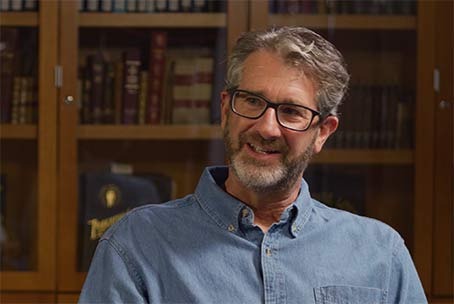'Why Read the Classics?'

Why read the Classics in an age of AI and advanced technology?
St. John’s Associate Dean for Graduate Programs David Carl is on the faculty of “Crossroads & Classics: Navigating Transitions with Art & Literature,” the first collaboration between St. John’s College and the Modern Elder Academy (MEA). He shared with us his reply to the above question:
As Dean of a Great Books Graduate Program, I’m often asked some version of the question, “Why read the classics in an age of AI and advanced technology?” The truth is, I think we should read the classics because they have the potential to make us better people. But this answer needs some explanation.
What is a classic?
By “classic” I mean any work of art or literature—a painting or film, poem or novel—whether it’s 3,000 years old or three years old—that provides us with an occasion for deep thought and reflection. A classic is a work that challenges our presuppositions and assumptions and offers us the opportunity for radical investigation of ourselves and the world we live in. Above all, a classic is an occasion for thought, reflection, and conversation. It is an invitation to slow down and think more deeply about the world and our place in it.
Reading is the art of paying attention
By “reading,” I mean that activity that helps foster this thought and reflection. We can “read” many things, from books to landscapes, paintings to human faces. We can read—and learn to read better—the night sky or a plate of food. Reading is not simply literacy but rather the art of paying attention. It involves slowing down, noticing things, and importantly, sharing with others what we notice. In this respect, reading is not only a private activity. Though it starts in private, reading becomes a shared activity when we think aloud and share in conversation our questions, uncertainties, and wonder.
Active reading equals active results
By “potential,” I acknowledge the unfortunate truth that the activities of reading and conversation do not automatically confer their benefits. These benefits, if they are to come, must be the result of work and effort. Reading is a pleasure, but at its best, it’s not a passive pleasure but an active one. It requires the kind of strenuous care we bring to certain activities because we believe that the more we put into them the more we will get out of them.
Working and developing together beyond radical relativism
Finally, what do I mean by “better?” We live in an age increasingly tempted by a kind of radical relativism. which is mistaken for open-minded tolerance. But tolerance and acceptance of the differences of others is not the same as relativism. Relativism at its core is indifference, not acceptance. Relativism says, “Everything is the same, nothing is better than anything else, and therefore nothing really matters more than anything else does.” This is a world from which value and care have been drained.
Opposed to this is that attitude insisting that some things are better than other things: for example, that open-mindedness is better than bigotry, knowledge is better than ignorance, education is better than indoctrination, and that it’s better to pay attention to the world around us than to move through it in a state of oblivion or distraction. This is what I mean by “better,” and this is what I believe certain kinds of reading, and the reading of certain kinds of works that I’m calling “the classics,” can help us develop. And this is why I think reading the classics is more important today than ever—and why it is not only something we need but something we need to do together.

